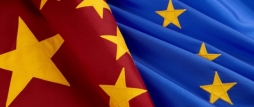
The EU and China
With George W Bush re-elected to the White House, many Europeans are gloomy about the future of transatlantic relations. The EU's relationship with Russia has also soured, and not only because of Moscow's attitude to Ukraine's fraudulent elections. But EU diplomats exude optimism when asked about China. Chinese leaders, unlike most Russians and Americans, like and respect the European Union. They hope that a stronger and more united EU can help to create a multipolar world that is free of US domination.
The EU has responded to this goodwill by offering China a 'strategic partnership', which implies a relationship that includes not only economic but also political ties. The objectives of most EU governments with regards to China are similar, so they should be able to build a common policy. Yet the EU has struggled to maintain a common line on China. The various interests and attitudes of the individual member-states, in particular the large ones, tend to weaken the EU position.
Economic links are strong. China's exports to the EU have risen by an astonishing 820 per cent since 1990, while EU sales to China have jumped by 600 per cent. This year, bilateral trade is expected to top €180 billion, making the EU China's largest trading partner, ahead of the US and Japan. EU-based companies have also ploughed vast amounts of investment into the booming Chinese market. Many EU companies, such as Volkswagen or Carrefour (a French retail giant), now rely heavily on China for their profits.
While trade relations have flourished, the EU has sought to deepen political ties. The annual EU-China summits are interspersed with regular high-level meetings. Some 20 bilateral dialogues already cover subjects ranging from human rights to shipping. China has earmarked €230 million to participate in Galileo, the EU's planned satellite navigation system. Some 100,000 Chinese students are enrolled at universities across the EU. A new travel agreement signed in 2004 will bring hundreds of thousands of Chinese tourists to Europe in coming years.
Looking forward, the EU and China should be able to build a stronger partnership on their many common interests and attitudes. Both are suspicious of the US's untrammelled power and strongly support a multilateralism that is based on the United Nations and international law. Both stress the need for sustainable economic growth. Both believe that 'soft' power, the ability to persuade, can be a more effective means of achieving foreign policy objectives than armed force. Both tend to be too busy with their own internal problems to expend much energy on global politics. But both know that they need to become more pro-active in resolving explosive conflicts, for example in the Middle East, not least because both the EU and China depend on imported energy. In contrast to the US-China relationship, the tricky question of Taiwan does not loom large in EU-China relations, at least for now.
But a true strategic partnership between the EU and China requires a more coherent policy on the EU side. EU unity vis-à-vis China remains fragile, for two reasons. The first is the role of the US. Washington regards China as a strategic rival and remains committed to defending Taiwan in case of attack. It therefore warns the Europeans against selling weapons to China. China is very keen for the EU to lift the arms embargo it imposed after the Tienanmen Square massacre in 1989. France and Germany want to lift it. But the Nordic countries claim that China has not done enough to improve its human rights situation, while the UK and some of the East European countries fear that ending the ban would further strain transatlantic relations.
The second reason for intra-European disagreements is commercial self-interest. The leaders of France, Germany and the UK have a track record of disregarding pre-agreed EU positions - for example at the UN human rights commission - in the hope that their national companies will win lucrative Chinese contracts. While understandable, such lobbying tends to be futile and counterproductive. Futile because the Chinese usually select their business partners on the basis of commercial logic rather than political preference. And counterproductive because it weakens the EU in its bilateral dealings with Beijing. For example, the European Commission is leaning heavily on the Chinese authorities to implement their WTO commitments to open up markets and better protect intellectual property. It is offering 'market economy status' as a carrot. All EU businesses in China would benefit from that country making good its promises. But sadly, the European Union's 'big three' have not given the Commission the unstinting support it deserves.
